Videos by Erin Araujo
March / Marzo 29- April / Abril 1
San Cristóbal de las Casas, Chiapas, Mexico
Deadline for CF... more March / Marzo 29- April / Abril 1
San Cristóbal de las Casas, Chiapas, Mexico
Deadline for CFP: Open until all spaces are filled 7 views
Published Papers by Erin Araujo
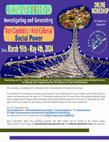
Capitalism / Coloniality depends upon the normalization of racialized, hetero-patriarchal, binary... more Capitalism / Coloniality depends upon the normalization of racialized, hetero-patriarchal, binary ideologies forged in the structural violences of hierarchy that limit access to all that is necessary to create well-being as individuals and as collectives. The way that knowledge is created, the categories and compartmentalizations required divide what is considered knowledge from that which is considered myth, gossip, backwards, worthless, cultural anachronism, etc. This implies the devaluation of all knowledge and practice that is not euro-capital-colonial-centric. The imposition of such epistemiology requires decades and generations of indoctrination, violence and dispossession to achieve.
This workshop is focused on privileging and strengthening the practices and methods used to create, value and recognize the experience / knowledge that is created through the lives and histories of people whose access to their own realities have been undermined by myriad forms of oppression, negation and gaslighting. We will look at how the persistent relationships among people, territory and non-human others have been devalued in Capitalist / Colonial systems and as such leaving the very existence of all life in peril. On the other hand, the persistence of relationships as relationality, comunalidad, and non-capitalist economic systems have also been the first-line of resistance, perseverance and creation of other ways of doing and being life. As scholars and activists we have a responsibility to break away from hierarchical structures of knowledge creation and practice while embracing the many forms of knowing and being that are the majority forms of existence. Let us come together in this seven-week workshop to dignify hidden and untold histories while creating futures that embrace flourishing.
More info: https://cambalache.noblogs.org/post/2024/01/16/716/
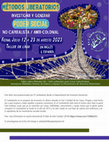
Métodos liberatorios para investigar y generar poder social no-capitalista / anti-colonial
El Capitalismo / Colonialidad depende de la normalización de ideologías raciales, heteropatriarca... more El Capitalismo / Colonialidad depende de la normalización de ideologías raciales, heteropatriarcales y binarias forjadas en las violencias estructurales jerárquicas que limitan el acceso a todo lo necesario para crear bienestar como individuos y como colectivos. La forma en que se crea el conocimiento, las categorías y compartimentaciones requeridas dividen lo que se considera conocimiento de lo que se considera mito, chisme, atraso, sin valor, anacronismo cultural, etc. La devaluación de todo conocimiento y práctica que no sea euro-capital-colonial-centrista ha requerido décadas y generaciones de adoctrinamiento, violencia y despojo para lograrlo. Este taller se centra en privilegiar y fortalecer las prácticas y métodos utilizados para crear, valorar y reconocer la experiencia/conocimiento que se crean a través de las vidas e historias de personas cuyo acceso a sus propias realidades ha sido socavado por innumerables formas de invisibilización, opresión y negación. Veremos cómo las relaciones persistentes entre las personas, el territorio y los otros no humanos se han devaluado en los sistemas capitalistas / coloniales y, como tal, la propia existencia de toda la vida está en peligro. Por otro lado, la persistencia de relaciones como la relacionalidad, la comunalidad y los sistemas económicos no capitalistas también han sido la primera línea de resistencia, perseverancia y creación de otras formas de hacer y ser la vida. Como académicos y activistas tenemos la responsabilidad de romper con las estructuras jerárquicas de creación y práctica del conocimiento, al tiempo que abrazamos las múltiples formas de conocer y ser que son las formas mayoritarias de existencia. Juntémonos en este taller de siete semanas para dignificar las historias ocultas y no contadas mientras creamos futuros que abracen el florecimiento.
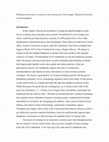
Indigenous Places and Colonial Spaces: The Politics of Intertwined Relations, 2018
In this chapter I discuss the possibilities of using decolonial thought to create diverse economi... more In this chapter I discuss the possibilities of using decolonial thought to create diverse economic praxis through action research. Possibilities for social change arise when a small but growing moneyless economy of 1,200 people strives to be a daily manifestation of decolonial spaces and relationships. These praxes are realized in a multi-ethnic, women’s moneyless economy called El Cambalache (The Swap in English) that began in March, 2015 in San Cristobal de las Casas, Chiapas, Mexico. The project is situated within the multiple Indigenous economies that exist parallel to the capitalist economy in Chiapas. The participants in El Cambalache are not only Indigenous peoples, rather, the project self-consciously draws on anti-essentialist understandings of identity that brings people together across class, gender and ethnic positions as they are performed in practice. El Cambalache explores the kinds of communities, interdependencies and mutual aid arises when money is removed from economic exchanges.
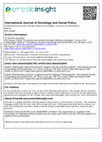
International Journal of Sociology and Social Policy, 2016
Purpose
The purpose of this paper is to explore how consensus decision making serves as a founda... more Purpose
The purpose of this paper is to explore how consensus decision making serves as a foundation for organizing an alternative economy while the agency of the economic project itself organizes participants because it serves to distribute resources as people need them and foment a community of sharing based on the concept that as individuals we are lacking but as a community we have enough. The paper asserts that as activists looking to foment change, alternative economic projects in themselves are actors in organizing community building and resistance to capitalism.
Design/methodology/approach
El Cambalache (The Swap in English), located in San Cristobal de las Casas, Chiapas, Mexico, is an exchange-based money-less economy that trades unwanted items as well as knowledge, abilities and skills that one wants to share. The project receives anything; specifically used, broken and/or unwanted electronics as well as just about anything else that one might possess. In exchange people provide laptop maintenance classes, language exchange, land to be worked, rooms, gardening services, objects, stories, etc. The rules in this money-less non-capitalist economy organize participation through one exchange or many.
Findings
Consensus decision making is an effective method for engaging in non-hierarchical research projects.
Originality/value
This project contributes to research in heterodox economies by presenting an original project with a new suggestion for exchange value as an inclusive process of exchange among participants in the economy. It also provides evidence that consensus decision making can be a useful and productive method for research.
This paper is comprised of a series of short, conversational or polemical interventions reflectin... more This paper is comprised of a series of short, conversational or polemical interventions reflecting on the political 'moment' that has emerged in the wake of the rise of right-populist politics, particularly in the Global North. We position the UK's 'Brexit' vote and the election of Donald Trump as US President as emblematic of this shift, which has a longer genesis and a wider scale than these events alone. In particular, we draw on anarchist principles and approaches to consider opportunities for re-energising and reorienting our academic and activist priorities in the wake of these turbulent times. Following a short introductory section, in which we collectively discuss key questions, challenges and tensions, each contributor individually draws from their own research or perspective to explore the possibilities of a politics beyond electoralism.
Anarchist economic research can take on performative methods. In order to understand how an anarc... more Anarchist economic research can take on performative methods. In order to understand how an anarchist economy creates and transforms social relationships, that economy has to be created in order to study it. In San Cristobal de las Casas, Chiapas, Mexico a small economy of moneyless exchanges is developing. El Cambalache (The Swap in English) is an all women-lead project that focuses on creating a non-hierarchical economy out of the reuse, repair and re-circulation of things that people no longer need and abilities, knowledge and services that people want to share. This article shares El Cambalache's theory of non-hierarchical exchange value, known as inter-change value. The economic practices used by El Cambalache reflect local Tzeltal and Tzotzil indigenous women's moneyless economic practices while expanding notions of diverse economies research in the majority world.
Why Don't the Poor Rise Up?, 2017
Araujo, E. (2017). “Resource-full Organized Communities Undermine Systems of Domination: How the ... more Araujo, E. (2017). “Resource-full Organized Communities Undermine Systems of Domination: How the Poor Rise Up in San Cristobal de las Casas.” In (Eds) Truscello, M. and Nangwaya, A. Why Don't The Poor Rise Up? AK Press
Recent scholarly writing on anarchist geographies often synonymously invoke the terms the state a... more Recent scholarly writing on anarchist geographies often synonymously invoke the terms the state and modernity. However, the specific form of the state can be understated, sometimes implying a monolithic entity; while references to modernity in similarly unifying terms reify both of these constructions as ubiquitous structures that inundate many aspects of quotidian experience. The chapter examines the implications of universalizing the concepts of the state and modernity independently and interchangeably through a diversifying framework which explores the spaces where the state and/or modernity are not omnipresent, but rather filled with an abundance of alternative ways of being and interacting. Based in experiences in with the Zapatistas in Chiapas, Mexico

Exchange and refurbish: practicing decoloniality through rethinking discards and degrowth
Degrowth theorists highlight the importance of communities of practice; creating working alternat... more Degrowth theorists highlight the importance of communities of practice; creating working alternatives to growth is central to the overall project of diverse economies. Erin Araujo’s work with El Cambalache (The Swap), a collective that shares and repairs donated items in San Cristobal de las Casas, Chiapas, Mexico, is an example of a degrowth economy in action. Araujo links the revaluation and repair of discarded materials to decolonization as a way to practice alternatives to singular ways of being and thinking that are based on growth, accumulation, and profit, which she argues is central to colonization and capitalization alike. The proliferation of alternatives to naturalized economic practices is central to both decolonization and degrowth. The work brings up the need to link both discard studies and degrowth to other social movements such as decolonization and feminism, as they share core premises of critiquing and expanding normalized value structures.
TeknoKultura, 2017
This article examines how consensus decision-making can be used as a method in creating spaces fo... more This article examines how consensus decision-making can be used as a method in creating spaces for generative justice. Based on empirical research in a moneyless economy in San Cristobal de las Casas, Chiapas, Mexico, the project called El Cambalache has created its own exchange value where everything in the economy shares equal value. The article is a praxiography of consensus decision-making as research method.
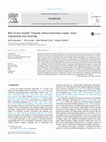
International trade of discarded electronics (e-waste) has become a matter of concern over the la... more International trade of discarded electronics (e-waste) has become a matter of concern over the last decade because of the actual and potential harms associated with their hazardous materials. An initiative under the aegis of the UN called the Best-of-Two-Worlds (Bo2W) philosophy is one solution to the e-waste problem that has gained some traction. Our dual purpose is to examine the ethical grounds of Bo2W and to propose an alternative program for action. We call this alternative ethical electronics repair, reuse, repurposing, and recycling (EER4). To explore the ethical grounds of Bo2W and to articulate EER4 as an alternative, we draw on notions of ethics, technology, and organization developed in science and technology studies (STS) and diverse economies literatures while empirically we explore a mixed methods case study of a small recycling firm in northern Mexico. Conceptually and empirically, our analysis points to a need for a richer imagination of the possibilities for economic action oriented toward managing discarded electronics. More broadly, our findings may act as a reminder that the space between use and discard proliferates the literal and figurative resources for enriching the imagination and enactment of diverse economic possibilities via the action of repair, reuse, repurposing, and recycling.
This paper is comprised of a series of short, conversational or polemical interventions reflectin... more This paper is comprised of a series of short, conversational or polemical interventions reflecting on the political ‘moment’ that has emerged in the wake of the rise of right-populist politics, particularly in the Global North. We position the UK’s ‘Brexit’ vote and the election of Donald Trump as US President as emblematic of this shift, which has a longer genesis and a wider scale than these events alone. In particular, we draw on anarchist principles and approaches to consider opportunities for re-energising and re-orienting our academic and activist priorities in the wake of these turbulent times. Following a short introductory section, in which we collectively discuss key questions, challenges and tensions, each contributor individually draws from their own research or perspective to explore the possibilities of a politics beyond electoralism.
Talks by Erin Araujo
This workshop addresses the need to develop collective decolonial methods for knowledge creation ... more This workshop addresses the need to develop collective decolonial methods for knowledge creation through collective auto-ethnography and the re-conceptualization of positionality through a collective understanding of epistemic liberation.
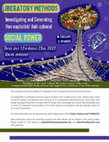
Liberatory Methods for investigating and generating non-capitalist / anti-colonial social power
Capitalism / Coloniality depends upon the normalization of racialized, hetero-patriarchal, binary... more Capitalism / Coloniality depends upon the normalization of racialized, hetero-patriarchal, binary ideologies forged in the structural violences of hierarchy that limit access to all that is necessary to create well-being as individuals and as collectives. The way that knowledge is created, the categories and compartmentalizations required divide what is considered knowledge from that which is considered myth, gossip, backwards, worthless, cultural anachronism, etc. The devaluation of all knowledge and practice that is not euro-capital-colonial-centric has required decades and generations of indoctrination, violence and dispossession to achieve. This workshop is focused on privileging and strengthening the practices and methods used to create, value, recognize, the experience / knowledge that is created through the lives and histories of people whose access to their own realities have been undermined by myriad forms of oppression, negation and gaslighting. We will look at how the persistent relationships among people, territory and non-human others have been devalued in Capitalist / Colonial systems and as such the very existence of all life is in peril. On the other hand, the persistence of relationships as relationality, comunalidad, and non-capitalist economic systems have also been the first-line of resistance, perseverance and creation of other ways of doing and being life. As scholars and activists we have a responsibility to break away from hierarchical structures of knowledge creation and practice while embracing the many forms of knowing and being that are the majority forms of existence. Let us come together in this seven-week workshop to dignify hidden and untold histories while creating futures that embrace flourishing.
Necesitamos otras economías. En los últimos meses, mundialmente hemos experimentado un fuerte cam... more Necesitamos otras economías. En los últimos meses, mundialmente hemos experimentado un fuerte cambio en nuestras vidas en torno al desarrollo del COVID-19 y las respuestas gubernamentales para frenar este virus. Las personas que viven precariamente el día a día, que sufren marginalización económica, social y legal, han sido puestas aún en más peligro de enfermedad, hambre, falta de remuneración y violencia. Estamos en un momento de fuertes cambios en la organización de jerarquías al nivel local y mundial. Nosotrxs somos la mayoría y nuestras economías pueden reflejar nuestro bienestar. Vemos que hoy más que nunca es necesario hacer economías no capitalistas, reconocer que nuestras Américas son ricas en conocimientos y prácticas milenarias de otras economías. ¡Ya es hora! ¡Vamos a trabajar y recuperar nuestras economías!
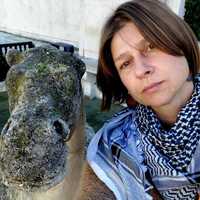


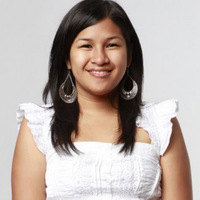

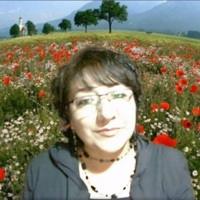





Uploads
Videos by Erin Araujo
El Cambalache Blog: https://cambalache.noblogs.org
El Cambalache Canal de Youtube: https://www.youtube.com /channel/UCslgLGj8V0LFxSaDnL8iYQg
Twitter: LaCambalachera
Instagram: Elcambalachesancristobal
El Cambalache FB: www.facebook.com/lacambalache
San Cristóbal de las Casas, Chiapas, Mexico
Deadline for CFP: Open until all spaces are filled
More information:
El Cambalache Blog: https://cambalache.noblogs.org
El Cambalache Canal de Youtube: https://www.youtube.com/channel/UCslgLGj8V0LFxSaDnL8iYQg
Twitter: LaCambalachera
Instagram: Elcambalachesancristobal
El Cambalache FB: www.facebook.com/lacambalache
Published Papers by Erin Araujo
This workshop is focused on privileging and strengthening the practices and methods used to create, value and recognize the experience / knowledge that is created through the lives and histories of people whose access to their own realities have been undermined by myriad forms of oppression, negation and gaslighting. We will look at how the persistent relationships among people, territory and non-human others have been devalued in Capitalist / Colonial systems and as such leaving the very existence of all life in peril. On the other hand, the persistence of relationships as relationality, comunalidad, and non-capitalist economic systems have also been the first-line of resistance, perseverance and creation of other ways of doing and being life. As scholars and activists we have a responsibility to break away from hierarchical structures of knowledge creation and practice while embracing the many forms of knowing and being that are the majority forms of existence. Let us come together in this seven-week workshop to dignify hidden and untold histories while creating futures that embrace flourishing.
More info: https://cambalache.noblogs.org/post/2024/01/16/716/
The purpose of this paper is to explore how consensus decision making serves as a foundation for organizing an alternative economy while the agency of the economic project itself organizes participants because it serves to distribute resources as people need them and foment a community of sharing based on the concept that as individuals we are lacking but as a community we have enough. The paper asserts that as activists looking to foment change, alternative economic projects in themselves are actors in organizing community building and resistance to capitalism.
Design/methodology/approach
El Cambalache (The Swap in English), located in San Cristobal de las Casas, Chiapas, Mexico, is an exchange-based money-less economy that trades unwanted items as well as knowledge, abilities and skills that one wants to share. The project receives anything; specifically used, broken and/or unwanted electronics as well as just about anything else that one might possess. In exchange people provide laptop maintenance classes, language exchange, land to be worked, rooms, gardening services, objects, stories, etc. The rules in this money-less non-capitalist economy organize participation through one exchange or many.
Findings
Consensus decision making is an effective method for engaging in non-hierarchical research projects.
Originality/value
This project contributes to research in heterodox economies by presenting an original project with a new suggestion for exchange value as an inclusive process of exchange among participants in the economy. It also provides evidence that consensus decision making can be a useful and productive method for research.
Talks by Erin Araujo
El Cambalache Blog: https://cambalache.noblogs.org
El Cambalache Canal de Youtube: https://www.youtube.com /channel/UCslgLGj8V0LFxSaDnL8iYQg
Twitter: LaCambalachera
Instagram: Elcambalachesancristobal
El Cambalache FB: www.facebook.com/lacambalache
San Cristóbal de las Casas, Chiapas, Mexico
Deadline for CFP: Open until all spaces are filled
More information:
El Cambalache Blog: https://cambalache.noblogs.org
El Cambalache Canal de Youtube: https://www.youtube.com/channel/UCslgLGj8V0LFxSaDnL8iYQg
Twitter: LaCambalachera
Instagram: Elcambalachesancristobal
El Cambalache FB: www.facebook.com/lacambalache
This workshop is focused on privileging and strengthening the practices and methods used to create, value and recognize the experience / knowledge that is created through the lives and histories of people whose access to their own realities have been undermined by myriad forms of oppression, negation and gaslighting. We will look at how the persistent relationships among people, territory and non-human others have been devalued in Capitalist / Colonial systems and as such leaving the very existence of all life in peril. On the other hand, the persistence of relationships as relationality, comunalidad, and non-capitalist economic systems have also been the first-line of resistance, perseverance and creation of other ways of doing and being life. As scholars and activists we have a responsibility to break away from hierarchical structures of knowledge creation and practice while embracing the many forms of knowing and being that are the majority forms of existence. Let us come together in this seven-week workshop to dignify hidden and untold histories while creating futures that embrace flourishing.
More info: https://cambalache.noblogs.org/post/2024/01/16/716/
The purpose of this paper is to explore how consensus decision making serves as a foundation for organizing an alternative economy while the agency of the economic project itself organizes participants because it serves to distribute resources as people need them and foment a community of sharing based on the concept that as individuals we are lacking but as a community we have enough. The paper asserts that as activists looking to foment change, alternative economic projects in themselves are actors in organizing community building and resistance to capitalism.
Design/methodology/approach
El Cambalache (The Swap in English), located in San Cristobal de las Casas, Chiapas, Mexico, is an exchange-based money-less economy that trades unwanted items as well as knowledge, abilities and skills that one wants to share. The project receives anything; specifically used, broken and/or unwanted electronics as well as just about anything else that one might possess. In exchange people provide laptop maintenance classes, language exchange, land to be worked, rooms, gardening services, objects, stories, etc. The rules in this money-less non-capitalist economy organize participation through one exchange or many.
Findings
Consensus decision making is an effective method for engaging in non-hierarchical research projects.
Originality/value
This project contributes to research in heterodox economies by presenting an original project with a new suggestion for exchange value as an inclusive process of exchange among participants in the economy. It also provides evidence that consensus decision making can be a useful and productive method for research.
Location: San Cristóbal de las Casas, Chiapas, Mexico
Dates: March 29-April 1, 2023
Registration Deadline for Proposals for Participation: November 16th, 2022.
Registration Deadline for Participants: February 25, 2023.
For a Complete Description and Registration Info: https://cambalache.noblogs.org/post/2022/10/26/gathering-autonomies-en-practice-2023-encuentro-autonomias-en-practica-2023/
Description:
This gathering is about bringing together as many people as possible to talk, think, question, imagine, and share practices of de/anti-colonial and anti-capitalist autonomy in general for communities, collectives, activists, researchers, and people practicing and studying de/anti-coloniality. We hope that this gathering will be the first of many to begin to define how we can incorporate autonomous decolonial and anti-colonial thought into our lives, work and knowledge. We invite all people who are interested in learning, deepening and sharing, to this three and a half day meeting. Sharing can be in the form of workshops, activities, artistic expressions, panels, and paper sessions.
We are convinced that knowledge is built collectively. Our proposal is to generate the space for dialogue/reflection/practice in an environment of respect, reciprocity and participatory action.
Topics:
Anti-capitalist / anti-colonial arts: group art sharing, can have ritual character that strengthens bonds. Generate experiences with the goal of healing. Art that feeds our struggle through expressions such as: music, graphic arts, theater, dance, etc.
Autonomous Social Movements: dialogue of practices, experiences and reflections of movements in defense of land and territories from our own knowledge. Our land and territories are the sustenance of life.
Collective Health: we value the knowledge and relational practices about health that, in wide-ranging forms of knowledge, are held by different peoples around the world. The logic of this knowledge implies a sentipensar (feelingthinking) with the earth-universe, building a common-collective healing reality.
Textile resistance: textile art is one of the arts of resistance that many indigenous peoples of the world have maintained for thousands of years. What is the importance and meaning of these manifestations of use and art practiced by indigenous peoples? Why have some of these practices and knowledge disappeared? Let's talk about the appropriation and usurpation (ethnocide and epistemicide) of this knowledge by the textile industry and fashion.
Food Resistance: it is said that we are what we eat, but where does our food come from, who produces it, how is it produced, how is it processed? We know that in indigenous communities this is done from their own knowledge and connection with the land; many times they are processes of food resistance against industrialization that generates diseases, inequalities and violence.
Indigenous Languages: living languages are the base of systems of thoughts and transmitters of identities, knowledge and values. What do they represent for the modern/capitalist world? What do they contribute to us? Why have some of them disappeared and others are in the process of disappearing? We share the practices that defend, preserve, revitalize their use and transmission.
Healing Economies: let's talk about the many non-capitalist systems, practices and possibilities that allow us to visualize and realize well-being and hope in the present and in the future. What possibilities are there to increase our non-monetary wealth while, at the same time, increasing non-capitalist socio-economic power for all people who have suffered precarity and marginalization by the capitalist/colonial system? Which practices have persisted over time?
Identities: the classifications of gender, race, culture, abilities, neuro-divergence, sexuality and more are imposed on us. What dialogues do we need to create an inclusive world? What learnings, practices and ways of experiencing the world do we carry into the future to generate well-being and heal the wounds of harmful oppressions that have limited the expression and self-realization of the majority of the world? What practices teach us to love and care for ourselves?
For whom?
We will bring together thinkers, scholars, activists, ambitious dreamers and practitioners to talk, act, strategize and dream through the supporting, reviving, and investigating decolonial economies and their networks.
This gathering is in English and in Spanish with simultaneous translation.
Keynote Speakers:
Yásnaya Elena Aguilar (Ayutla Mixe, 1981) is a member of COLMIX, a collective of young Mixe people who carry out research and dissemination activities on Mixe language, history and culture. She studied Hispanic Language and Literature and completed a Master’s degree in Linguistics at UNAM. She has collaborated in various projects on the dissemination of linguistic diversity, development of grammatical content for educational materials in indigenous languages, and documentation projects and attention to languages at risk of disappearing. She has been involved in the development of written material inMixe and in the creation of Mixe-speaking readers and other indigenous languages. She has been involved in activism for the defense of the linguistic rights of indigenous language speakers, in the use of indigenous languages in the virtual world and in literary translation.
Ochy Curiel Pichardo, born in the Dominican Republic and currently lives in Colombia. Decolonial feminist. PhD and MA in Social Anthropology from the National University of Colombia. Professor at the National University of Colombia and the Javeriana University. She is a decolonial feminist activist, co-founder of the Latin American Group of Studies, Formation and Feminist Action (GLEFAS). Her research addresses the intertwining of racism, sexism, classism and the regime of heterosexuality from a decolonial perspective. Her publications include the books La Nación Heterosexual. Analysis of the Legal Discourse and the Heterosexual Regime from the Anthropology of Domination (2013) and A Coup d’Etat: Sentencia168-13. Continuities and Discontinuities of Racism in the Dominican Republic (2021).